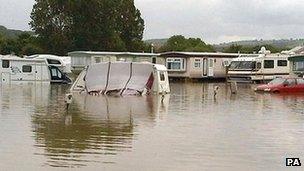Wales floods: Summit looks at improving resilience
- Published
Last year serious floods hit north and mid Wales and one woman died
A summit is considering how Wales can respond to the growing threat posed by flooding.
Last year serious floods hit north and mid Wales, and one woman died.
Environment Minister John Griffiths announced that the Welsh government plans to spend £47m in 2013/14 on schemes to protect 1,000 homes.
However, that is likely to be less than the amount spent on flood defences and dealing with coastal erosion in the previous two years.
"We know our climate is changing and that as a result we are set to see, and have already seen, an increase in rainfall and storms," Mr Griffiths said.
By working together and sharing knowledge "we can vastly improve our resilience to flooding in Wales", he said.
Outlining his plans, Mr Griffiths said: "Continued investment in flood and coastal erosion risk management is a vital part of our work to manage flood risk, and in spite of a reduction in our overall budget from the UK government the Welsh government has maintained its level of investment in this area.
'Prioritising investment'
"In 2013/14 I am investing £47m in flood and coastal erosion risk management which will pay for major flood defence schemes in some of our most vulnerable communities including Swansea vale, Fairbourne, Corwen and Coldbrook, Barry.
This would protect 1,000 homes and businesses currently at risk of flooding.
Although the Welsh government's "baseline" spending on flood defences is growing slightly, other sources of funding have been cut.
The £47.2m earmarked for the next financial year compares to £52.7m this year and £51.9m the previous year.
In the past extra funding has become available during the year, meaning the amount that is eventually spent could rise if the same happens again.
Mr Griffiths added: "It is so important that we effectively target our funding for flood defence..
"That is why my national strategy includes a commitment to developing a national funding policy as well as a method for prioritising investment.
"A group has been set up to progress this work and once completed the national programme of investment will enable areas of Wales to be ranked according to risk from all sources of flooding and coastal erosion."
Landslips
Last year was a disastrous one for flooding in Wales. In June, a month's worth of rain fell in 24 hours in Ceredigion, hitting Aberystwyth and surrounding villages, trapping people in their homes and flooding caravan parks.

Flooding at an Aberystwyth caravan park last June
In November, a 91-year-old woman died and more than 1,000 people had to leave their homes after the River Elwy burst its banks in St Asaph, Denbighshire.
In December, heavy flooding hit the Vale of Glamorgan while homes in Ystalyfera in the Swansea Valley were evacuated after landslips brought thousands of tonnes of soil down onto a road.
Monday's summit in Cardiff unites the Welsh government, local authorities, the Met Office, Environment Agency Wales, Welsh Water, and other organisations. It coincides with climate change campaign Climate Week.
Emyr Roberts of Natural Resources Wales, a new agency that will take over responsibility for Environment Agency Wales, the Countryside Council for Wales and the Forestry Commission next month, said he thought Wales had the right approach to flooding in the past.
'Protect properties'
"Obviously in many areas the answer is to raise flood defences, but increasingly we're putting more emphasis on communities - raising awareness about what the flooding risks are and what individuals can do about it," he said.
"Obviously, we're working very closely with the emergency services, but I think the summit... will be looking at longer term issues and ways in which we might use the natural environment to alleviate the problems of flooding."
Local Government Minister Carl Sargeant said the role of the local community was also important in tackling the challenges caused by severe weather. Communities which develop a flood plan can act more quickly and effectively when flooding happens.
"It is vital that services comes together and work hard to save lives, protect property and help communities recover," said Mr Sargeant.
"This was demonstrated in serious flood incidents last year and we owe our emergency services a debt of gratitude for their professionalism, commitment and dedication."
- Published4 March 2013
- Published22 January 2013
- Published17 January 2013
- Published23 October 2012
- Published30 September 2012